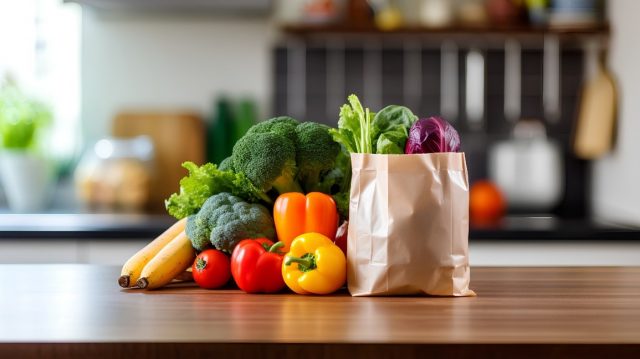Darnell Holloway, a health and fitness enthusiast, explains that embarking on the journey toward a vibrant and healthy life doesn’t have to be a drain on the wallet. In the following article, Darnell Holloway unlocks the secrets to embracing a wholesome and nutritious diet without breaking the bank. From smart grocery shopping to simple yet impactful culinary choices, Holloway unveils budget-friendly strategies to make wholesome food choices.
In the pursuit of a vibrant and positive life, the role of nutrition cannot be overstated. A well-balanced and nutritious diet is a cornerstone of overall well-being, influencing not only physical health but also mental and emotional vitality.
The Holistic Impact of Nutrition
Nutrition is not just about the number of calories; it’s about fueling your body with the essential nutrients it needs to function optimally. Darnell Holloway says that a balanced diet has far-reaching effects on energy levels, cognitive function, emotional well-being, and even the radiance of your skin. Understanding the holistic impact of nutrition is the first step toward cultivating a radiant and healthy life.
Breaking Down Nutritional Myths
One common misconception is that maintaining a healthy diet is an expensive endeavor. However, dispelling this myth is crucial, as it opens the door to budget-friendly alternatives that can significantly contribute to your well-being. Darnell Holloway discusses practical strategies to nourish your body without straining your finances.
Embracing Whole Foods on a Budget
Whole foods, such as fruits, vegetables, whole grains, and lean proteins, form the foundation of a nutritious diet. Contrary to the belief that these foods are expensive, they can be budget-friendly if approached strategically. Darnell Holloway suggests that local farmers’ markets, bulk buying, and seasonal produce are excellent ways to incorporate whole foods into your diet without breaking the bank.
Growing a backyard garden is another cost-effective and rewarding way to produce healthy, nutritious food. By cultivating your own fruits, vegetables, and herbs, you can significantly reduce your grocery expenses while enjoying the benefits of fresh, homegrown produce. This sustainable approach not only contributes to a more budget-friendly lifestyle but also allows individuals to embrace a healthier and more self-sufficient way of living. Gardening provides a hands-on experience, fostering a deeper connection to the food you consume and promoting overall well-being. With proper planning and care, a backyard garden can become a thriving source of affordable, nutritious ingredients for your meals.
 Mastering Meal Planning and Batch Cooking
Mastering Meal Planning and Batch Cooking
Meal planning is a powerful tool in maintaining a healthy diet on a budget. By strategically planning meals for the week, you can create a shopping list that minimizes food waste and prevents impulsive, potentially costly purchases. Darnell Holloway says that batch cooking is another game-changer, allowing you to prepare larger quantities of meals and store them for later use, saving both time and money.
Exploring Affordable Protein Sources
Protein is a crucial component of a healthy diet, and fortunately, there are various affordable sources available. Incorporate budget-friendly proteins such as beans, lentils, eggs, and canned tuna into your meals. Darnell Holloway says that these options not only provide essential amino acids but also offer versatility in your culinary creations.
Making Smart Choices in the Grocery Aisles
Navigating the grocery store strategically is key to budget-friendly healthy eating. Opt for store brands, compare prices, and consider buying generic versions of certain products. Additionally, exploring the perimeter of the store, where fresh produce, dairy, and proteins are often located, can lead to healthier and more economical choices.
Harnessing the Power of Frozen and Canned Produce
Darnell Holloway explains that fresh produce is ideal, but frozen and canned options can be just as nutritious and more budget friendly. Frozen fruits and vegetables are convenient, have a longer shelf life, and are often more affordable than their fresh counterparts. Canned goods, such as tomatoes, beans, and tuna, are pantry staples that can be incorporated into various nutritious recipes.
DIY Snacking and Avoiding Processed Foods
Snacking can be a stumbling block when it comes to maintaining a healthy diet on a budget. However, opting for homemade snacks like trail mix, yogurt with fruits, or vegetable sticks with hummus can be both nutritious and cost-effective, essentially keeping you fuller, longer. Steering clear of processed and pre-packaged snacks not only benefits your health but also your wallet.
 Cultivating a Mindful Eating Practice
Cultivating a Mindful Eating Practice
Darnell Holloway says that beyond the choices you make in the grocery store, adopting a mindful eating practice can significantly impact your overall well-being. Paying attention to portion sizes, savoring each bite, and avoiding mindless eating can help prevent overconsumption and, subsequently, reduce food expenses.
The Cost of Unhealthy Habits
While investing in a healthy diet may seem like an upfront cost, it’s essential to consider the long-term implications of unhealthy eating habits. The potential costs associated with medical bills, decreased productivity, and a diminished quality of life far outweigh the expenses of adopting a nutritious diet.
Conclusion: A Sustainable Path to Radiant Living
In conclusion, nourishing your way to a radiant life is not only achievable but can also be budget-friendly with the right strategies. Embracing whole foods, mastering meal planning, exploring affordable protein sources, and making mindful choices in the grocery aisles are steps on the path to a healthier and more vibrant life. Darnell Holloway says that by understanding the holistic impact of nutrition and dispelling the myth that healthy eating is prohibitively expensive, you can embark on a sustainable journey toward well-being that aligns with both your health goals and your budget.








